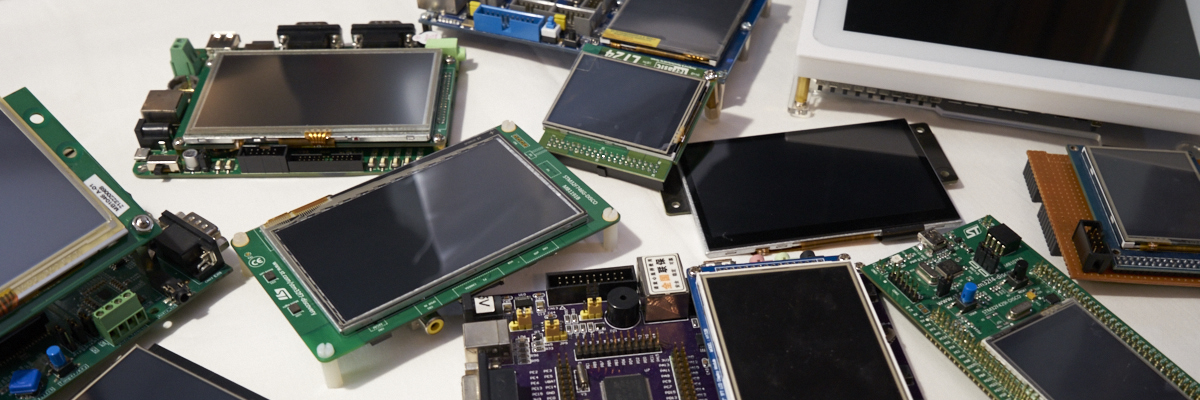-
Posts
2,659 -
Joined
-
Last visited
-
Days Won
2
Content Type
Forums
Store
Downloads
Blogs
Everything posted by Joel Bodenmann
-
This was an issue ("typo") in the uGFX library itself. We pushed a fix to the master branch. Please update the corresponding file in your project and this error should be gone. Sorry for the trouble. ~ Tectu
-
You are using a "strange" version of uGFX. I have replace the 'ugfx' directory with the latest master and I can compile without any problems (after adding all the other missing uGFX files to the Em::Blocks project tree). Note that you have to fix the GDISP_USE_DMA macro in the configuration file. It needs to be either set to TRUE or FALSE (I recommend not to mess with DMA until you got the display working). ~ Tectu
-
I have downloaded the project again from the link in your first post but I don't see any board files in the src directory. It looks like you left them in the driver directory. Note that you will also have to add those new files in the Em::Blocks project file tree. ~ Tectu
-
Hello fastlink, I took a look at your project and it seems like you are missing the actual board files for both the display and the touch screen. You need to supply two files which tell uGFX how to talk to your display and to your touch screen controller. In your case you can copy the following two files from the uGFX library directory: /drivers/gdisp/SSD1289/board_SSD1289_template.h /drivers/ginput/touch/ADS7843/gmouse_lld_ADS7843_board_template.h Copy those two files to your project directory (the place where you also have your main.c) and drop the _template in the file names. Then fill in the routines. You can read more about board files here: http://wiki.ugfx.org/index.php?title=Board_File Let us know if you have any questions about the board file implementation. ~ Tectu
-
I am deeply impressed. We would love to put this on our demos page. ~ Tectu
-
We'd love to see a video of this - is it possible for you to make a public available one? ~ Tectu
-
With the method mentioned above it is only possible to rotate by 90 degrees as your display won't provide any other orientations that than. When we will implement this feature ourself it will be most likely possible to rotate by 90 degrees as well as by any degree value (the 90 degrees will just be a lot quicker). ~ Tectu
-
Depending on the GCC version that you are using you might encounter a linking error when building an uGFX project under Linux. This is due to a very well known bug in one of the latest versions of GCC. To bypass this problem, simply disable the LTO feature. When you're using our Makefiles you can just set the OPT_LINK_OPTIMIZE macro to no: OPT_LINK_OPTIMIZE = no This will produce a slightly larger binary but on a Linux enviornment this shouldn't be that much of a problem. ~ Tectu
-
No problem, I know this situation. Worst thing on earth ~ Tectu
-
It looks like we won't have time to get this done within the next couple of weeks as we are working on some other quite vital parts of the uGFX project. Did you proceed in any manner? ~ Tectu
-

BUG: DejaVuSans20_aa.c has wrong font names
Joel Bodenmann replied to tobib's topic in Development and Feedback
Thank you very much, we just fixed this as well: https://bitbucket.org/Tectu/ugfx/commit ... e2b551775a Please keep us up to date about any other upcoming bugs. We are thankful for any bug report as this helps to drastically increase the quality of the library. We also just added you to the community table on our website. We can add your real name if you like. ~ Tectu -
Thank you very much, we have just fixed this issue: https://bitbucket.org/Tectu/ugfx/commit ... 39aa742c06 We appreciate bug reports like this a lot! ~ Tectu
-
Hello Tobi and welcome to the community! We have experienced many many problems with all the ILIxxxx based display controllers over the time. Most issues were related to the fact that Chinese sellers claimed to send you an ILI9320 but you actually got an ILI9325. Then there are too many different revisions of the same chip out there all with something different. When your D15 pin/bit would have a problem you would clearly not be able to successfully use the screen after modifying the version in the driver source. You would not only see colors that are completely wrong but you would most likely not be able to initialize the controller at all. Therefore, I think we can rule out this problem. If everything is working for you I can add that particular version number to the driver. ~ Tectu
-
I haven't had any time to take a closer look at the driver yet. I don't even have such a key pad. However, we will take a look at your work and include it into the repository. Maybe somebody else will have time to give this a try Anyway, thank you very much for your contribution, we appreciate it a lot as things like this help to not only push the project forward but also to build up an active community. Edit: inmarket is currently working on the keyboard part of the GINPUT driver. As this would be used with that keyboard driver he'll take a look. ~ Tectu
-
That is correct. It is recommended to place all your files you want to upload into a .zip file as these files are attachable. I'll let inmarket handle this driver issue. ~ Tectu
-
Hello Loosa and welcome to the community! I'm afraid the console widget itself does not support unicode. This widget was one of our earliest ones and it was mainly intended to be used for debugging purposes. We never thought that it will actually be used by end users. Therefore, it provides only very limited functionalities. We should probably plan to rewrite the entire widget soon. If you end up writing your own (which is actually quite easy due to the classes provided by the GWIN module) we'd be happy to see your code. We'd also be more than happy to help you wherever we can. ~ Tectu
-
Hello ellboy and welcome to the community! There is currently no API that allows string rotation but we are planing to include that soon. We already added matrix rotation alogrithms to the GMISC module a couple of days ago. However, there is a small work around: You can change the orientation of your screen, draw the string and change the orientation back again. Note that this method however only works if you have a display controller that does not redraw the framebuffer content when you change the orientation. This is the case with most display controllers such as the SSD and the ILI families. ~ Tectu
-
You shouldn't include the font source files (*.c files) into your build tree manually as they are already included by the top-level font file. Removing all the .c files should fix this linking error. ~ Tectu
-
The MAX11802 touchscreen driver by steved has been added to the repository. ~ Tectu
-
Glad to hear that it is working! Please let us know what you did with uGFX in the end. We are stil searching for projects for our demo site on the project homepage ;-) ~ Tectu
-
We appreciate every new port and we are more than willing to help whenever you have any question. I'm sorry but I don't really understand your question. uGFX does not have to do anything with IDEs. It can be used with any IDE or even with the built-in Make system. As every IDE does handle the build and file tree differently, there's nothing we can do but just give a step-by-step guide that can be found in the wiki. ~ Tectu
-
Hello Moran and welcome to the Community! There is currently no uGFX port for mbed.org at all. However, with some basic C knowledge it should be possible to implement this by yourself. There's a module called GOS in the uGFX system. This module handles the OS abstraction and that is what you need to implement. You should start by adding the two files /src/gos/mbed.c and /src/gos/mbed.h. There are by now many OSes that are already supported and therefore you should have plenty of implementation examples that should give you an idea. The two most important ports that might serve as a good template to you are the ChibiOS/RT and the FreeRTOS port. When it comes to RTOSes, most routines can be implemented using simple #define wrappers anyway. Sadly the wiki article about creating a new port is far from complete: http://wiki.ugfx.org/index.php?title=GOS However, the forum is always here to help you out whenever you face any issue. We're looking forward for your new port ;-) ~ Tectu
-
It would be easier for us if you could attach your complete compiler output log. ~ Tectu
-
Hello baptistes and welcome to the community! Same here, that's why all our code is 100% Makefile based ~ Tectu
-

TFT Display ILI9325 Driver with ARM M3 Core (STM32F103)
Joel Bodenmann replied to LeMoussel's topic in Support
Now we hit a different problem: We have many issues with the ILI based display drivers because they exist in many different versions. Often you get an ILI9320 instead of an ILI9325 and vice-versa. In order to finally get your display running, please take the initialization code (that are all the write_reg commands in your LCD_Init() routine and replace the ones in the drivers initialization routine (gdisp_lld_init() routine in /drivers/gdisp/ILI9325/gdisp_lld_ILI9325.c) with them. Let us know when you have any questions. We are sorry for this inconvenience but we have not found a good solution to this problem yet. We will add an optional custom initialization code interface in the future. ~ Tectu

